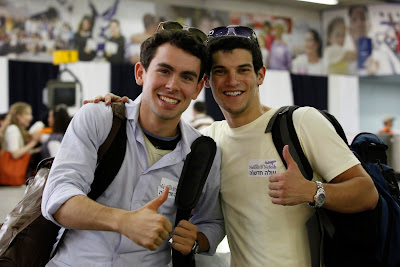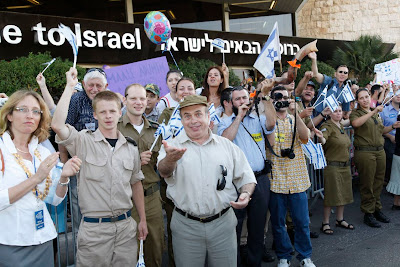
Argaz? Chozeh? Or maybe even Ben-Zion? The question of whether to change my name occupied my thoughts as El Al flight ## departed American soil and took off for Israel with 232 new olim (immigrants)—plus seven dogs and one cat— on board. Chester had served as my family’s name since my grandfather arrived in Canada from Russia in the early decades of the twentieth century. In choosing a new name I wanted to echo the spirit of the pre-state pioneers (like David Grün, better known to history as David Ben-Gurion) who adopted more Hebraic names on their arrival to Israel.
Before departing my brother’s wedding, I had convened a family summit of sorts to propose possibilities for my new name. Ben-Argaz, later modified to ארגז Argaz, came from my older brother who preferred the biblical term for a chest, ala a treasure chest, to the Hebrew term for a human chest, חזה chazeh. The theme, of course, is to sustain a parallel to the name Chester. Others were sympathetic to Ben-Zion, my father’s middle name and an obvious candidate for the heavy Zionist implications. And then there was my brilliant younger brother’s suggestion that I simply adopt his own name. Sammy Jonathan Shai. Sorry, Shai, not going to happen.
Two days later a friend suggested the name חוזה Chozeh. The meaning, “one with vision,” appealed to me for a bunch of reasons, including the association with the prophets of the bible like my namesake Samuel and the sages of Jewish history like the Chazon Ish and the Chozeh of Lublin. Plus, there is an obvious parallel to chazeh, which for all of its less than desired connotations of breasts is admirable in the sense that it is the chest that houses the human heart and other key organs. In Modern Hebrew chozeh most often denotes a contract, a meaning that has its own affirmative appeal. Finally, there are the transliterated and phonetic angles to the term: Chozeh in English is almost written as Chester. And the name sounds like Jose, a cute shout-out to my nonexistent Hispanic roots.
I wavered between Argaz and Chozeh as the official from the Interior Ministry approached me on board the aircraft. In her hand she held the electronic form on which my official name in Israel would be registered. Suddenly she was standing by my side. With bated breath, I scanned the form and informed her I needed to change my name. “Are you sure?” “Yes,” I told her, “I have never been as sure about anything in my life.” And with a flourish of her digital pen, she changed my middle name from יונתן to יהונתן , adding the ה that my parents chose to grace me with eight days after I was born.
Today my name in Israel remains שמואל יהונתן צ'סטר. In the end I decided against changing my last name. Part of the reason is that as personal as my name is, it remains a piece of my identity I would prefer to receive from someone else. The logic is rooted in the fundamental role that communication and language play in my appreciation for human relationships. The other key reason why I deferred changing my name is because I see my aliyah as marking the return of my greater family, past and present, to Israel. While we may never know when the last “Chester” departed the land, today we know when the Chesters returned.

The rest of the flight passed in a blur of excitement. I sat next to a friend, name of Nicky, who will be joining me on kibbutz as we prepare for the army. Our section of the plane were all about my age, with young families and a few elderly folks sitting in another section of the small El Al jet. As we prepared to descend to Ben Gurion Airport, Nicky and I laid tfellin and davened shacharit. Reciting the same prayers that have accompanied me through every morning of my life was the first time the emotional power of what I am doing hit me. For years they were simply words. And now like in the legends of the Zohar, the words have come to life.

Nicky and I walked down the gangplank, sun in our eye. We hit the pavement, backed off a few steps and bowed low to kiss the burning cement. The first Israeli to welcome me to Israel was a young reporter from army radio, Galei Zahal. She had interviewed me over the phone back in New York and now was on hand to record my first steps in Israel.


A few minutes later Natan Sharansky and a hundred others were welcoming us home with spinning flags and soaring tunes. I quickly locked eyes with my cousin, who had returned to welcome me at the same airport where she had arrived on aliyah nearly two decades ago.

After a flurry of speeches, I received my te'udot oleh, the first proof of my new citizenship. In a few days time would come further formal procedures. But the deed, the dream, has now slipped into the realm of reality.





No comments:
Post a Comment